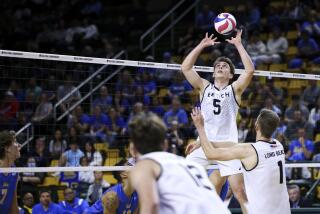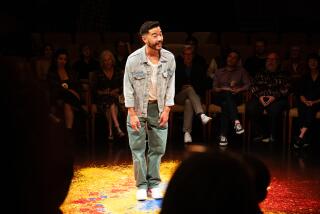In a Boy’s Memory, the Gift of Play
- Share via
In Aidan Gaffney’s fifth summer, life changed. There were fewer good days when he felt the lure of street sweepers and garbage trucks as they growled past his Westwood home. He loved to watch them, and his body would tremble with anticipation as he sat in his wheelchair on the curb awaiting their arrival.
He became too ill to sit beneath the palm tree at Palisade Park, built on a bluff near the ocean, where he often watched the dance of waves and clouds and drifted with them to peaceful sleep.
Still, Aidan had seen where the playground was to be built. Aidan’s Place, his parents called it, a place where he could play with his two younger brothers, where he could be wheeled in his chair onto playground equipment and imagine and forget and laugh with them.
By mid-June, his mother, Nicole Gaffney, was acting differently. In the past, when he didn’t feel well or when he was preparing for one of more than 20 surgeries, she would draw close to him and say: “Mommy lives for you, Aidan. That’s why my heart beats, because you’re here when I wake up.”
She didn’t say that anymore.
Most of his time was spent in bed, where he was cared for by a team of nurses, physicians, therapists and family members. A ventilator helped him breathe; morphine helped free him from pain.
Doctors were never able to diagnose his condition, but by the time he was a year old, it was evident that life would come with great challenges. At 19 months, he had the first of three heart bypass surgeries. There also were problems with his liver and kidneys. One of his vocal cords was paralyzed, so he couldn’t speak. His bones didn’t seem to grow, and he never weighed more than 30 pounds. Still, Aidan had a soft touch, rosy cheeks and inviting brown eyes.
The Gaffneys, Nicole and Charles, decided early on that they would do everything possible to bring fullness to his life, however long or short it might be. They took him places, to the zoo or beach or to the street corner to watch for buses. Time suddenly took on urgent meaning in their lives. “Every day,” said Nicole, “had to matter.”
Aidan’s Place was to be the second “boundless playground” in the Western United States. The first, Shane’s Inspiration in Griffith Park, opened last year. More playgrounds, accessible to children with and without physical disabilities, are planned--for Pacoima, South-Central Los Angeles, Pico Rivera, Santa Fe Springs, San Juan Capistrano, Corona and Childrens Hospital Los Angeles.
With help from the developers of Shane’s Inspiration, the Gaffneys began raising $900,000 to build the playground. “Aidan, we’re going to build the park, and it’s for your sixth birthday,” Nicole would say. “This is what we’re giving you as a present.”
Today the Gaffneys make good on their promise. The opening of Aidan’s Place, next to the Westwood Recreational Complex, 1350 Sepulveda Blvd., will be celebrated at 10 a.m. on what would have been Aidan’s sixth birthday.
For the Gaffneys it is a day of two dreams, one that comes true with the opening of the playground and one that ended at 7 a.m. June 26, when Aidan died.
Charles and Nicole, high school sweethearts, grew up in the small town of Armonk, N.Y., where their families, like most in town, knew each other. Their lives were neat and easy, their bodies strong. Nicole competed in gymnastics at Rutgers University; Charles played football at Middlebury College in Vermont. They were married in January 1993.
They had moved to Los Angeles and were still in their 20s when Aidan was born, Dec. 5, 1995. He weighed only 5 pounds, and there were immediate concerns.
He wasn’t eating and seemed to lack reflexes. He wouldn’t grasp fingers when they were placed in his small palms. Health problems revealed themselves one after another.
He never walked, never talked, but his mind was healthy. To get someone’s attention, he would make a clucking sound, answering questions yes and no and communicating through gestures.
Nicole, 34, had been a teacher but never returned to work after Aidan was born. She held Aidan in her arms as he slept, and when she showered, he would be close by in a bouncy seat. Charles, 34, was working for a business that made promotional products, but in 1998 formed his own company so he would have more flexibility and time with his family. “I don’t take anything for granted now,” he says. “Aidan taught me to see what was really important.”
The Gaffneys had never known anyone who went through life in a wheelchair, who had to work so hard just to breathe. No one who inspired or needed them so much.
From the beginning, Aidan loved books. His favorite was “The Carrot Seed,” the story of a child who planted a seed that others said would never flourish. It is a story about never giving up.
It reflected Aidan’s hope, Aidan’s story. He listened as the book was read to him hundreds of times during the years. The readers would always substitute Aidan’s name for the boy’s name in the story. If they forgot, Aidan would cluck, insisting that his name be used.
Even as they came to terms with Aidan’s condition, the Gaffneys decided to more forward with their plans to have more children. Doctors assured that it was unlikely Aidan’s condition would reoccur. The couple had two more sons, Conor, now 3, and Declan, 2.
Aidan had a calming effect on people, including his brothers. When Conor was fussy as a baby, Nicole and Charles would wrap him in a blanket and set him next to Aidan in bed, and Conor would soon fall asleep.
When Aidan was hospitalized and heard another child crying, he would make his clucking sounds until someone checked on the child and the crying stopped.
Whenever he wanted something, he would make the sound--and he would play a game with his mother in which he clucked and clucked as Nicole scurried about trying to figure out what he wanted.
His laughter resulted in a wheezing sound and was more evident in his eyes when they filled with joy.
Whenever it came time to talk about Aidan’s next surgery, the inherent risks were weighed against the richness of life he found and shared with those around him.
Earlier this year, that changed. The odds of successful surgery shifted, and suddenly they were talking less about how he might live and more about how he might die. Nicole and Charles decided to keep their son at home. They had helped him live, and now they would help him die, drifting, as if with clouds and waves, to peaceful sleep.
“We wanted no pain and no fear,” said Charles.
The night before Aidan died, his brothers were next to him watching a Barney video. Aidan did not open his eyes to watch the video, but maybe he heard it, Charles said, and maybe he felt the warmth of family, and maybe he was not afraid.
They did not want Aidan to hold on for them, prolonging his suffering. So Charles spoke to his son from a place in his heart that Aidan helped him find.
“Mommy and Daddy are going to be OK,” he said. “We’re going to take care of your brothers. You need to take care of yourself.”
Aidan opened his eyes before he died. Nicole saw him smile. From the time he was born with so many needs, her heart beat for him.
She made sure her love was spread equally among all three children, but nearly every afternoon, from 1 to 4, when Conor and Declan were taking naps, she would sit with Aidan on the couch. That was their time to be alone.
As Aidan’s heart grew weak, as he became less responsive, she knew it was time to let go. That’s when she stopped telling him to fight, to hold on. “It’s OK,” she told him. “You go play with the angels.”
Quietly he passed. It was Tuesday, the day before the street sweeper came.
This morning at Aidan’s Place, about 200 children are expected to attend. Maria Shriver will read from her book “What’s Wrong With Timmy” (2001, Little, Brown), which tells the story of a girl learning about disabilities.
There will be a puppet show and refreshments as children and adults play together, celebrate Aidan’s life and see what carrot grew from a tiny seed of hope.
More to Read
Sign up for Essential California
The most important California stories and recommendations in your inbox every morning.
You may occasionally receive promotional content from the Los Angeles Times.













